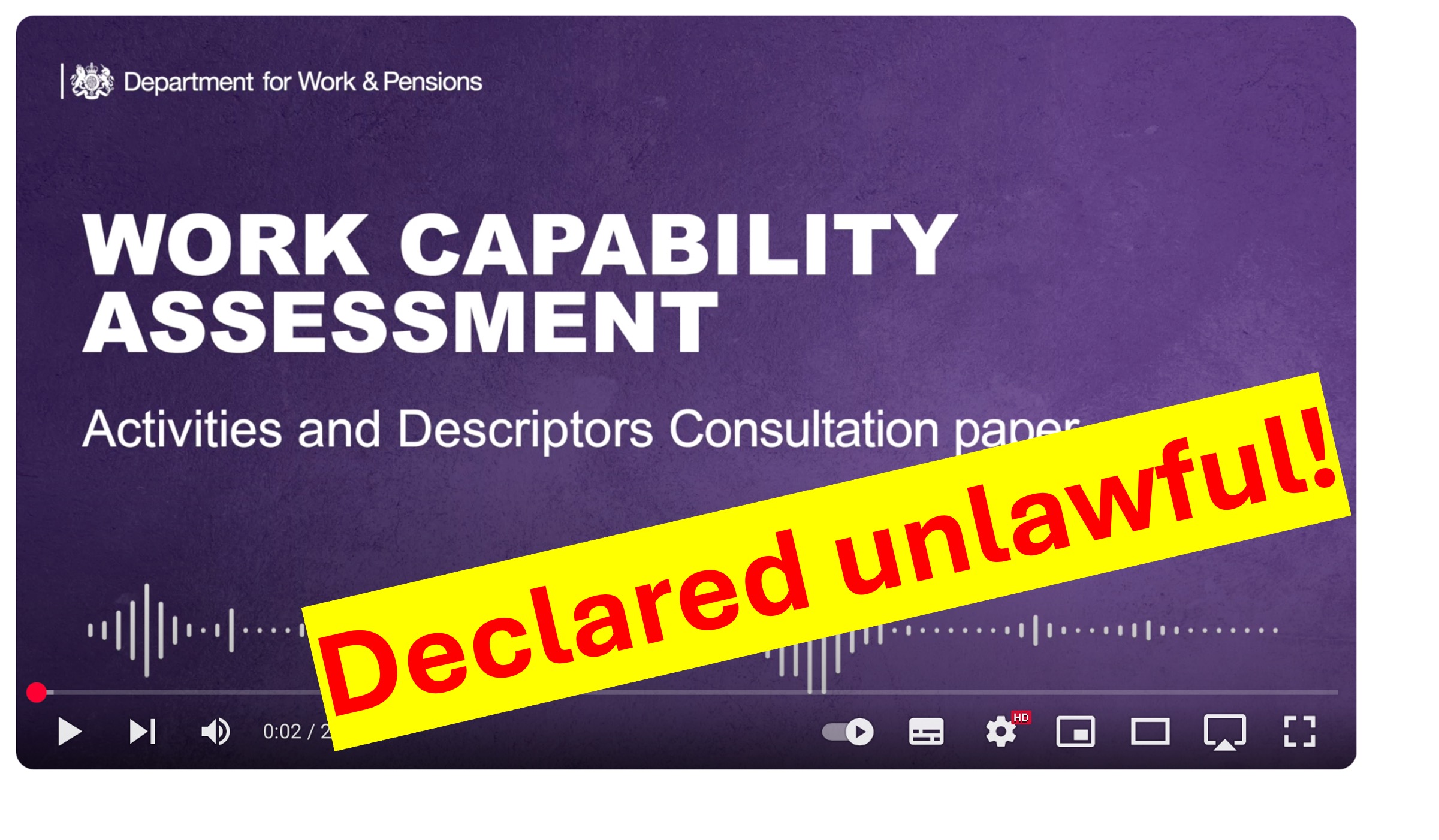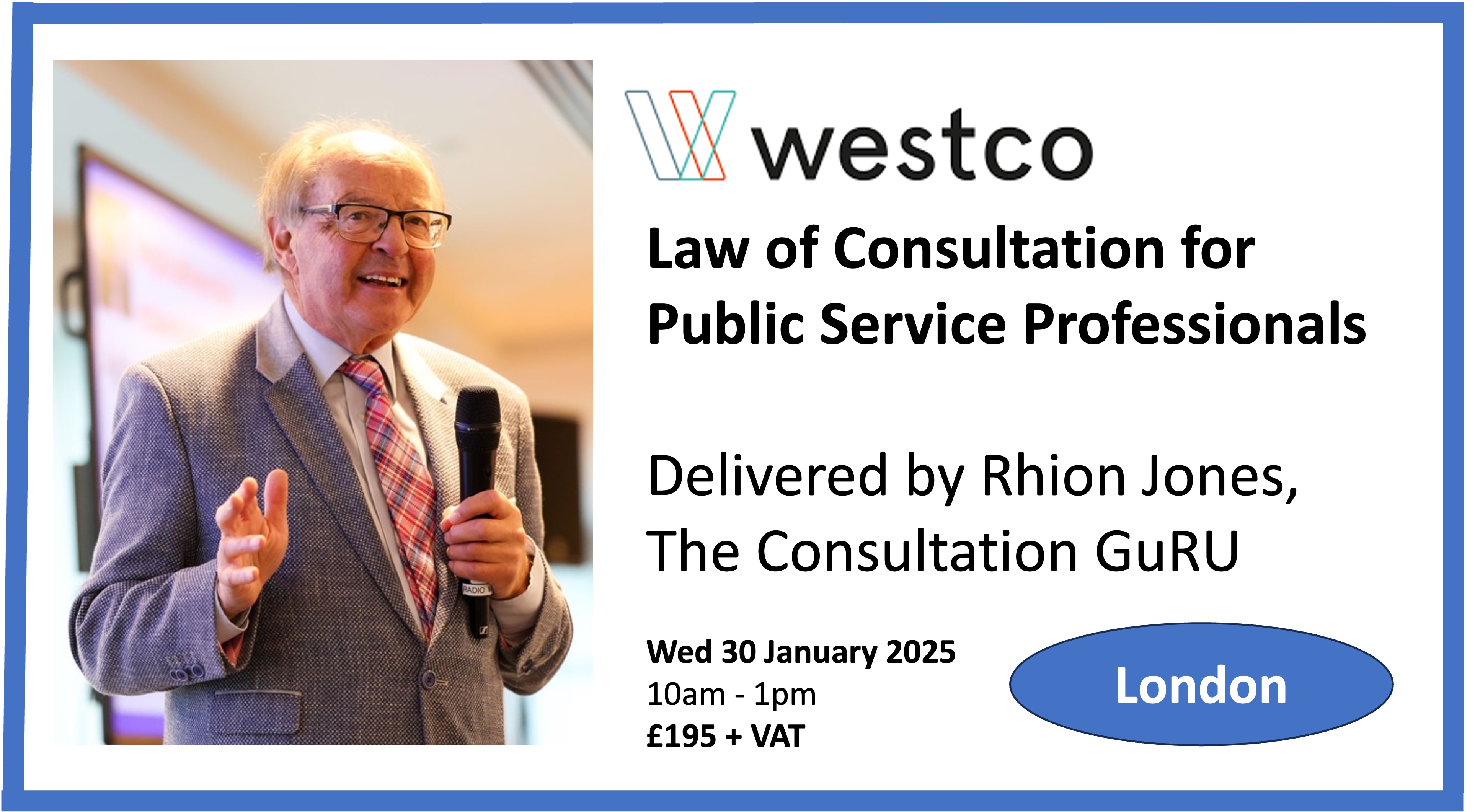This is Blog No 90
Yesterday, Mr Justice Calver handed down a judgment in the case of R (Ellen Clifford) v Secretary of State for Work and Pensions [2025] EWHC 58 (Admin). It declares that an 8-week consultation by the Department of Work & Pensions held in September/October 2023 on the issue of Work Capability Assessments was unlawful.

The good news for Liz Kendall, the current Secretary of State – is that it was not her doing!
The Secretary of State at the time was the Rt. Hon Mel Stride.
The bad news for Labour is that despite the lamentable explanations offered by the DWP, public money has yet again been wasted defending the indefensible. Why do Ministers continue to indulge Government lawyers who have for years sought to persuade Judges to excuse poorly managed or dishonest public consultations? This commentary explores why situations like this arise.
First – the facts. They are simple. Rishi Sunak’s Government (as, no doubt its successor) became worried about the increasing numbers of people too unwell to work. It floated a number of policy initiatives including, in the long-term, abolishing the Work Capability Assessment. Quite properly, civil servants explored what could be done in a shorter timescale and focused on potential changes to the criteria, arguing that changes in the world of work – particularly home working, might justify different rules for assessment. Internal documents chart the evolution of these ideas, and a decision was taken to mount a consultation.
Inevitably there was a parallel agenda to reduce public expenditure and political pressure to identify savings in the welfare budget so that the Office of Budget Responsibility (OBR) could ‘score’ the projected savings in time for its November 2023 Report and intended to inform the next Public Expenditure Review.
This gave officials a problem. They did not have the ‘evidence base’ to support the anticipated consultation narrative. And there would not be enough time to plan and deliver a consultation to the expected standards and to a realistic timetable. In typically polite terms, they ‘advised’ the Minister (who, it seems had his own doubts!) that this was a risky strategy. They acknowledged that whilst
“we recognise that you have been asked to deliver significant savings to an Autumn Budget ….: our
recommendation remains that to deliver this safely and have time to work through difficult changes for a
complex and sensitive group we should work to a Spring timeline. The presentational risk of a rushed
reform is significant and could be detrimental to our ability to deliver our structural reforms.”
The Judge helpfully comments that the reference to “delivering this …project “safely” is presumably … delivering it without it being susceptible to challenge under the Gunning principles!”
They decided not to wait, and went head in September 2023. The result, unsurprisingly, was a badly botched exercise, targeted at some of the most vulnerable in society and over a period universally regarded by all the disability representative groups and charities as totally inadequate to enable them to absorb and respond to the proposals. On this, the Judge agreed.
What made it worse, however, was that the proposals concentrated upon the positive advantages of helping people back into work. Nowhere was it mentioned that the Department estimated that 424,000 disabled people per annum would lose on average £416 in benefit every month, and that up to 100,000 of them might be driven into ‘absolute poverty’.
Where was the impact assessment?, you ask. There wasn’t one. Officials were furiously trying to gather the evidence as the consultation went ahead.
This disturbing case raises many questions. It is not as if this was a one-off.
DWP – because of the impact its decisions has on disadvantaged people – is particularly prone to legal challenges and in 2023 was very fortunate to have a decision finding the consultation on its Disability Strategy unlawful, overturned by the Court of Appeal (See Blog 34 for my analysis). But other departments also have a poor track record.
There are, in my view three relevant causes.
- Senior civil servants do not take sufficient account of consultation requirements in the advice they give Ministers. Tom Brown has just published a fascinating study of the dynamics of these critical relationships in his book The Mind of the Minister. He and I have already started a discussion on the curious fact that there seems to be little or no sense of dialogue on these matters when important policy-making is undertaken.
- A possible explanation may be that civil servants do not receive sufficient training in stakeholder management, public engagement and consultation. With the sad demise of the Consultation Institute, the options may be more limited, but the need is clear. Simple schoolchild errors continue to creep into official documents alongside a failure to appreciate the consequences of getting these things wrong.
- What’s happened to the necessary checks and balances? When the DWP decided to soldier on in spite of officials’ misgivings, where was the DWP legal team in not having the gumption to stop the department from launching a consultation on the likely withdrawal of benefits for huge numbers of disabled people without even mentioning it in the consultation document?
A few weeks ago, Lord Hermer, the Attorney General made a speech on the rule of law which I championed in Blog 84. I particularly liked his commitment that “on entering Government, to improve the standards we adhere to when we make policy and law – and specifically to ensure that the processes we adopt support the rule of law.” How does this fit with the DWP in December going to Court to defend this particularly poor consultation?
Maybe the root cause is that the state of Government consultation remains in a mess and needs reform.
I continue to believe we need an Office of Public engagement to oversee public consultations and ensure they meet minimum standards. Without this, or something similar, we will continue to have an embarrassing conveyor belt of unnecessary consultation cases.
Rhion H Jones LL.B
Commentaries are prepared primarily to help consultation practitioners take account of developments in the law and to guide them on situations where legal advice should be sought. They are no substitute for reading Court judgments or studying statutory provisions or associated Guidance.
Rhion has monitored and written commentaries on the Law of Consultation since 2007 but does not provide legal advice. He will, however, be happy to discuss the content of this or any other commentary.
For More like this and to register to receive the monthly two-page Consultation Catch-up free of charge: now click here

Booking link is HERE
Leave a Comment
I hope you enjoyed this post. If you would like to, please leave a comment below.